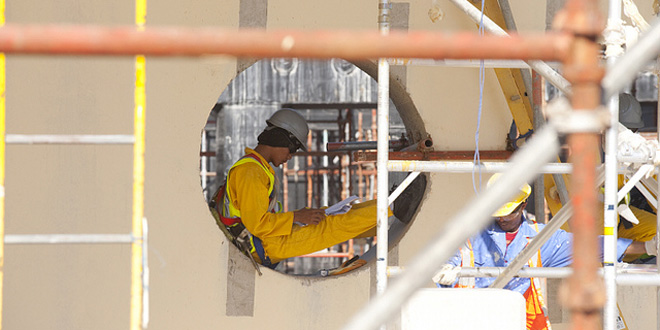Cooperation between groups of workers, international unions and embassies is slowly opening up Qatar to scrutiny, but all we’re learning is the same old bad news.
When it comes to Qatar, and the fate of workers preparing the country to host the World Cup, there’s been a lot of talk about statistics. The ITUC believes 7,000 migrant workers – men of working age – will die in Qatar before the first ball is kicked. Qatar hits back by claiming that there have been no deaths on stadia, while at the same time doing everything it can to restrict access to the worksites and accommodation camps that we know have been claiming lives.
In the end though, it’s important to remember what those numbers refer to. People. Human beings with names. One of those was Juanito B. Pardillo.
Juanito, a construction worker employed digging tunnels for Doha’s new metro system, should have been celebrating his 38th birthday on March 8. Instead, his body was being prepared for repatriation back to his grieving family in the Philippines.
On 28 February, Juanito and his workmates were carrying out excavations. Press reports provide scant details, but apparently it was raining, and company policies state that tunnel work must stop in bad weather. However, for whatever reason, this didn’t happen. Juanito was killed in the cave-in that followed. Four of his workmates were injured.
Qatar then engaged in its usual secrecy. The name of the victim was not released by either the authorities or the company – QVCD, a partner to French contractor Vinci – with the information eventually coming through the press. An investigation into the death is supposedly being conducted, but two weeks after the accident officialdom remains quiet. Without the report, Juanito’s family have no hope of getting compensation, nor can real pressure be put on the company responsible to ensure other workers are safe.
The main part of Qatar’s metro rail scheme, like so much of their current infrastructure boom, was promised as part of their bid to FIFA for the World Cup and, also like much of the infrastructure, it appears that Qatar’s haste to have everything ready in advance of 2022 is leaving workers exposed to poor government health and safety inspection and flouted company regulations. The country’s PR machine has been desperate to downplay the human cost of the World Cup, focusing on the (officially, at least) positive health & safety record of the stadia themselves, but it cannot hide the dangerous reality for those getting the country ready for the tournament.
Workers in Qatar have begun the process of – very carefully, given Qatar’s hostility to its migrant labour force looking after itself – setting up support networks to share health and safety education and legal information. However, operating under Qatar’s restrictive laws, these networks can only do so much to challenge lazy employers or the notoriously slow labour courts. Some embassies, notably that of the Philippines, are helping facilitate this process but, as Juanito’s case demonstrates, in the end Qatar still holds all the cards.
The BWI, the global union federation representing construction workers and responsible for the “Red Card for FIFA” campaign, is demanding urgent action not just from the government, but from Vinci as well, to assess the negligence of its partner company and take responsibility for compensating the family and preventing future tragedies. All western companies in Qatar must work with a local partner, making joint liability an inescapable moral requirement. BWI are also pressing QDVC to accept their inspectors on of all its worksites, which would be the first widespread trade union inspections of Qatar’s construction industry.
In the meanwhile, Juanito B. Pardillo’s family now have his body but still no formal news of why he died and whether anything will ever be done to hold those responsible to account.
Image © Shell https://creativecommons.org/licenses/by-nc-nd/2.0/

